新目标八年级上册-英语语法知识点精讲+练习
新目标八年级上册英语词汇语法专练及答案

新目标八年级上册英语词汇语法专练一、根据句意及首字母提示完成单词。
1.Don't l at that old man. It’s not polite(礼貌的).2.Call English Study Center at the telephone number for more i if you want to know more.3.He is not funny, and he is always very s .4.-What does your little brother do? -He is a p school student.5.Health is very important. It is n for us to exercise every day.6.My twin brother is more o than me.7.Liu Gang joined the a when he was 20 years old.8.The boy couldn’t find his mother, so he cried as l as he could.9.The question is pretty s .I’m sure he can answer it.10.You didn't come to the party, can you tell me the r ?11.He was from a p mountain village and he had no money for school.12.He told his parents his ideas about the camping several times, but theyd with him at last.13.Lucy was so u that she lost her wallet.14.David studies very hard, so he always gets good g in tests.15.Li Ming is nine years old and he studies in a p school.16.I told you to clean the room, you didn’t clean it, (可是).17.His sister didn't do well in the singing c (比赛).18.The little boy is very smart but not (工作努力的).19.Grace is three years old and she can speak (清楚地).20.It is (必要的) for as to exercise every day.21.The British teacher is very humorous. He always tells us (笑话).22.He is good at many things and he is a (有才能的) person.23.These are two (票)for the concert this evening. Can you go with me?24.My English teacher is always (准备好的) with advice for our study and life.25.I think it is a really (有教育意义的) movie.26.Li Lei is more (外向的) than Lin Tao.27.He is a (辛勤的) boy.28.We can get some useful (信息) on the Internet.29.He (赢得) a beautiful notebook in the English contest.30.It's (必要的;必需的) for kids to do more housework at home.二、用所给单词的适当形式填空。
(新版)新目标英语八年级上册Unit03语法知识点

Unit 3 I’m more outgoing than my sister.Section A (1a —Grammar Focus)● 1.“Is this/that …?”用于交际场合,尤其是互相介绍和询问时,this和that指“这位”“那位”或“这个人”“那个人”。
—Is this Miss Wang?—Yes, it is.2. this/that还用于电话用语中,在打电话时问“你是……吗?”用“Is that …?”,回答“我是……”用“This is…(speaking).”—Is that Li Lei?—No, this is Li Ping (speaking).●Sam has longer hair than Tom = Sam’s hair is longer than Tom’s(=Tom’s hair,不能用Tom,只能同类事物相比较).● 1. Both…and…“……两者都”,连接名词或代词作主语,其后的谓语动词用复数形式,其否定形式可为“neither…nor…”。
Both you and I are in Class Five.否定形式:Both you and I aren’t in Class Five. 我和你不都在5班。
(不完全否定)Neither you nor I am (就近原则) in Class Five. 我和你都不在5班。
(完全否定)2. pron./adv. both(两者)否定为:neither(两者中)任何一个不all(三者或三者以上)否定为:none(三者或三者以上)没有人或没有物。
All of them are English. = They are all English. 他们都是英国人。
否定:None of them is (are) English. 他们都不是英国人。
Both of them are doctors. = They are both doctors. 他们俩都是医生。
八年级英语上册Unit 6知识点及练习题(新版新目标)

八年级英语上册Unit 6知识点及练习题(新版新目标)Unit6I’mgoingtostudycomputerscience.一,语法:begoingto的用法“begoingto+动词原形”表示将来的打算、计划或安排。
常与表示将来的tomorrow,nextyear等时间状语或when引导的时间状语从句连用。
其各种句式变化借助be助动词完成。
be随主语有is,am,are的变化,goingto后接动词原形。
当堂检测一、用begoingto的适当形式填空.—what____________you____________tomorrow?—I____________Unclewang.2.LiLeiandjim____________footballgamethedayafterto morrow.3.____________they____________fishingnextSaturday?4.There____________abirthdaypartythisevening.5.—Listen!what________they__________?—They____________songs.—Thenwhat____________they____________thisafternoon?—They____________somethingformrLi.6.what_______you_________nextFriday?7.where________they_________somefruit?8.LinTao_________________japanesenextterm.二.单项选择1.Thetrain______________infiveminutes.A.isgoingtogoB.isgoingc.willgoingD.goes2.—whereisjimgoingtomove?He’sgoingto______________Newyork.A.movedtoB.movedc.moveD.moveto3.—There___________aconcertthisevening.—yeah.Excitingnews!A.aregoingtobeB.isgoingtobec.isgoingtohaveD.willhave4..Ihaveadream.whenI___________,Iwanttobeascientist.A.makeupB.comeupc.growupD.turnup5.Iwanttomoveto___________.A.interestingsomewhereB.somewhereinterestingc.interestingwhereD.whereinteresting二、句型转换。
人教版新目标八年级上册-英语语法知识点

人教版新目标八年级上册英语语法知识点(一)一般将来时一般将来时表示将来某个时间要发生的动作或者存在的状态。
通常与表示将来的时间状语连用,如tomorrow, the day after tomorrow, next year, next month, next week, in 100 years等。
be going to do(动词原形)结构:表示打算、准备做的事情或者肯定要发生的事情。
如:It is going to rain.will do结构表示将来的用法:1. 表示预见Do you think it will rain?You will feel better after a good rest.2. 表示意图I will borrow a book from our school library tomorrow.What will she do tomorrow?基本构成如下:一般疑问句构成:(1)will+主语+do…? Will Sarah come to visit me next Sunday?(2)there be 结构的一般疑问句:Will there + be …?Will there be fewer trees? Yes, there will. / No, there won’t否定句构成:will + not (won’t)+doSarah won’t come to visit me next Sunday.特殊疑问句构成:特殊疑问词+will+主语+…?What will Sarah do next Sunday?★★练一练★★根据例句,用will改写下列各句例:I don’t feel well today. (be better tomorrow)I’ll be better tomorrow.1. Gina has six classes today. (have a lot of homework tonight)_____________________________2. I’m tired now. (sleep later)_____________________________3. My parents need a new car. (buy one soon)_____________________________4. We can’t leave right now. (leave a little later)_____________________________5. The weather is awful today. (be better tomorrow)_____________________________答案:1. She’ll have a lot of homework tonight.2. I’ll sleep later.3. They’ll buy one soon.4. We’ll leave a little later.5. Maybe it’ll be better tomorrow.(二)should的用法:should用来提出建议和忠告,后边加动词原形,否定句直接在should后边加not.例如:I think you should eat less junk food.我认为你应该少吃垃圾食品。
新版新目标英语八年级上册unit7语法总结
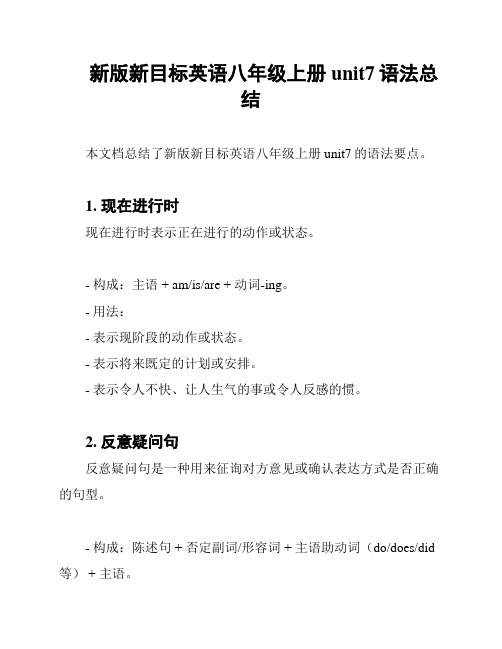
新版新目标英语八年级上册unit7语法总
结
本文档总结了新版新目标英语八年级上册unit7的语法要点。
1. 现在进行时
现在进行时表示正在进行的动作或状态。
- 构成:主语 + am/is/are + 动词-ing。
- 用法:
- 表示现阶段的动作或状态。
- 表示将来既定的计划或安排。
- 表示令人不快、让人生气的事或令人反感的惯。
2. 反意疑问句
反意疑问句是一种用来征询对方意见或确认表达方式是否正确的句型。
- 构成:陈述句 + 否定副词/形容词 + 主语助动词(do/does/did 等) + 主语。
- 用法:用于征询对方意见或确认句子的真实性。
3. with引导短语
with引导的短语可以修饰名词或句子。
- 修饰名词:
- 表示状态或特征。
- 表示方式、工具或手段。
- 修饰句子:
- 表示伴随或条件。
4. 省略to的不定式
在某些情况下,可以省略to的不定式前的to。
- 具体情况:
- 动词make、let、help、have。
- 表示让步的as if、as though、if only。
- 作宾语的动词感官动词如see、hear、feel。
以上是新版新目标英语八年级上册unit7的语法总结。
人教新目标英语八年级上册Unit10重难点知识讲解+练习题(无答案)
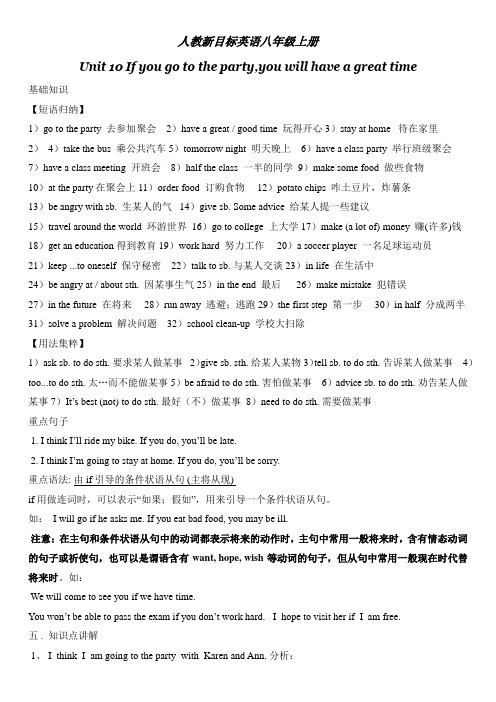
人教新目标英语八年级上册Unit 10 If you go to the party,you will have a great time基础知识【短语归纳】1)go to the party 去参加聚会 2)have a great / good time 玩得开心 3)stay at home 待在家里2) 4)take the bus 乘公共汽车 5)tomorrow night 明天晚上 6)have a class party 举行班级聚会7)have a class meeting 开班会 8)half the class 一半的同学 9)make some food 做些食物10)at the party 在聚会上 11)order food 订购食物 12)potato chips 咋土豆片,炸薯条13)be angry with sb. 生某人的气 14)give sb. Some advice 给某人提一些建议15)travel around the world 环游世界 16)go to college 上大学 17)make (a lot of) money 赚(许多)钱18)get an education 得到教育 19)work hard 努力工作 20)a soccer player 一名足球运动员21)keep ...to oneself 保守秘密 22)talk to sb. 与某人交谈 23)in life 在生活中24)be angry at / about sth. 因某事生气 25)in the end 最后 26)make mistake 犯错误27)in the future 在将来 28)run away 逃避;逃跑 29)the first step 第一步 30)in half 分成两半31)solve a problem 解决问题 32)school clean-up 学校大扫除【用法集粹】1)ask sb. to do sth. 要求某人做某事 2)give sb. sth. 给某人某物 3)tell sb. to do sth. 告诉某人做某事 4)too...to do sth. 太…而不能做某事 5)be afraid to do sth. 害怕做某事 6)advice sb. to do sth. 劝告某人做某事 7)It’s best (not) to do sth. 最好(不)做某事 8)need to do sth. 需要做某事重点句子1. I think I’ll ride my bike. If you do, you’ll be late.2. I think I’m going to stay at home. If you do, you’ll be sorry.重点语法: 由 if 引导的条件状语从句 (主将从现)if 用做连词时,可以表示“如果;假如”,用来引导一个条件状语从句。
人教版新目标八年级上册-英语语法知识点
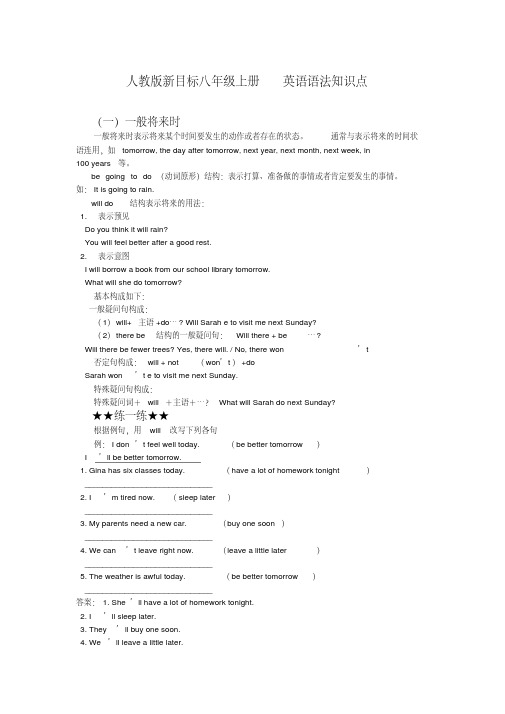
人教版新目标八年级上册英语语法知识点(一)一般将来时一般将来时表示将来某个时间要发生的动作或者存在的状态。
通常与表示将来的时间状语连用,如tomorrow, the day after tomorrow, next year, next month, next week, in100 years等。
be going to do(动词原形)结构:表示打算、准备做的事情或者肯定要发生的事情。
如:It is going to rain.will do结构表示将来的用法:1. 表示预见Do you think it will rain?You will feel better after a good rest.2. 表示意图I will borrow a book from our school library tomorrow.What will she do tomorrow?基本构成如下:一般疑问句构成:(1)will+主语+do…? Will Sarah e to visit me next Sunday?(2)there be 结构的一般疑问句:Will there + be …?Will there be fewer trees? Yes, there will. / No, there won’t 否定句构成:will + not (won’t)+doSarah won’t e to visit me next Sunday.特殊疑问句构成:特殊疑问词+will+主语+…?What will Sarah do next Sunday?★★练一练★★根据例句,用will改写下列各句例:I don’t feel well today. (be better tomorrow)I’ll be better tomorrow.1. Gina has six classes today. (have a lot of homework tonight)_____________________________2. I’m tired now. (sleep later)_____________________________3. My parents need a new car. (buy one soon)_____________________________4. We can’t leave right now. (leave a little later)_____________________________5. The weather is awful today. (be better tomorrow)_____________________________答案:1. She’ll have a lot of homework tonight.2. I’ll sleep later.3. They’ll buy one soon.4. We’ll leave a little later.5. Maybe it’ll be better tomorrow.(二)should的用法:should用来提出建议和忠告,后边加动词原形,否定句直接在should后边加not.例如:I think you should eat less junk food.我认为你应该少吃垃圾食品。
人教新目标版八年级英语上册Unit3语法、知识点归纳及训练
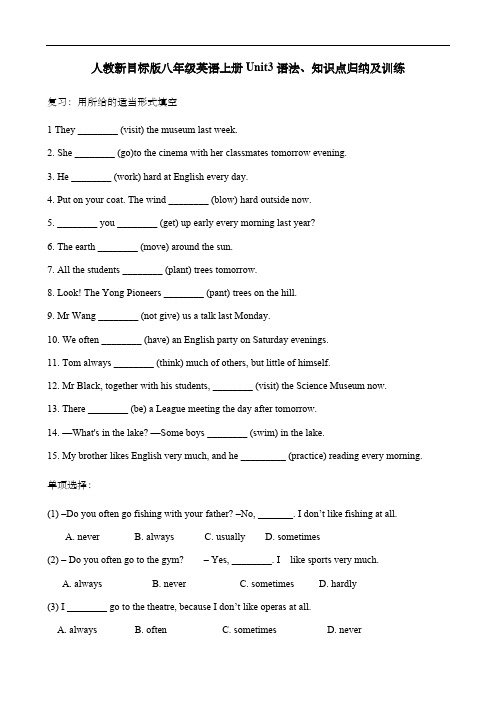
人教新目标版八年级英语上册Unit3语法、知识点归纳及训练复习:用所给的适当形式填空1 They ________ (visit) the museum last week.2. She ________ (go)to the cinema with her classmates tomorrow evening.3. He ________ (work) hard at English every day.4. Put on your coat. The wind ________ (blow) hard outside now.5. ________ you ________ (get) up early every morning last year?6. The earth ________ (move) around the sun.7. All the students ________ (plant) trees tomorrow.8. Look! The Yong Pioneers ________ (pant) trees on the hill.9. Mr Wang ________ (not give) us a talk last Monday.10. We often ________ (have) an English party on Saturday evenings.11. Tom always ________ (think) much of others, but little of himself.12. Mr Black, together with his students, ________ (visit) the Science Museum now.13. There ________ (be) a League meeting the day after tomorrow.14. —What's in the lake? —Some boys ________ (swim) in the lake.15. My brother likes English very much, and he _________ (practice) reading every morning.单项选择:(1) –Do you often go fishing with your father? –No, _______. I don’t like fishing at all.A. neverB. alwaysC. usuallyD. sometimes(2) – Do you often go to the gym? – Yes, ________. I like sports very much.A. alwaysB. neverC. sometimesD. hardly(3) I ________ go to the theatre, because I don’t like operas at all.A. alwaysB. oftenC. sometimesD. never(4) He says he will come to see us tomorrow afternoon.A. sometimeB. some timeC. sometimesD. some times(5) Speak aloud, please! I can _____ hear you.A. almostB. hardlyC. usuallyD. sometimes(6) My cousin wants to keep slim. She does exercise every morning and __ eats meat.A. hardlyB. alwaysC. usuallyD. often(7) —Miss Zhou is very popular with the students.—Yes. Her classes are_________ lively and interesting.A. alwaysB. sometimesC. hardlyD. never(8) —Have you ever been to Disneyland?—No, ______.I hope I can go there next year.A. alwaysB. sometimesC. neverD. often(9) —Zhang Lili, "the most beautiful teacher", has moved us deeply.—Yes, and she is__________ popular with her students.A. sometimesB. neverC. alwaysD. hardly(10) I don’t think fast food is good for our health, so I _______ go to MacDonald.A. hardlyB. alwaysC. usuallyD. often语法学习:形容词是用来修饰名词或不定代词,说明事物和人的性质和特征的一类词,在句子中用作定语、表语、宾语补足语;而副词用以修饰动词、形容词或其他副词,在句子中作状语、表语、补语和定语。
新目标八年级上册英语Unit5语法与词汇练习及答案

新目标八年级上册英语Unit5语法与词汇练习用括号内所给单词的适当形式填空。
1.The students are having a ________(discuss) about these TV programs.2.Mr. Yang teaches children with special________(education) needs.3.My mother likes soap ________(opera),but my father doesn't.4.The TV show is really _____(excite).I love it. 5.Do you mind ___(talk) about the game show?6.Sarah decided ________(work) in a hospital in London.7.I forgot ________(tell) him the news last week.So he knew nothing about it. 8.Remember ________(practice) playing the guitar this afternoon.9.They want ________(climb) the mountain this weekend.10.He hopes ___(win) the running competition. 11.Alice likes to see ________(comedy) best. 12.The news in yesterday's newspaper was ________(wonder).13.His classmate doesn't like ________(act) movies at all.14.It's ________(enjoy) to listen to music when I am free.15.We were all happy when we heard the ________(excite) news.16.You can't expect ________(learn) a new sport in a few days.17.Larry wants _______(visit) her grandparents this Sunday morning.18.We're planning ________(go) to Beijing on vacation next week.19.The little boy wishes ________(fly) to the moon one day.20.I try ________(get) good grades in this Chinese exam.21.She decided _____(leave) here a little earlier.22.I'd like ________(write) a book about myhometown.23.His daughter is learning ___(play) the piano.24.They hope ________(stay) in Hong Kongfor another two weeks.25.My teacher can help ________(bring) outthe best in me.26.He likes making friends with people fromdifferent ________(culture).27.Which question is ________(simple),thefirst one or the second one?28.My uncle ________(become) a dentist fiveyears ago.29.Linda is ready to ________(try) her best tohelp her classmates.30.Is Li Jiacheng the ____(rich) in Hong Kong?31.Dale was ________ (lucky) yesterday.Hebroke his left leg.32.Ann always tries her best _____(learn) math.33.Jim ________ (lose) his watch yesterday.34.The talent show was very _______ (success).35.I can't stand ______(wash) too many clothes.36. I plan _______ (go) camping with myclassmates by the river.37. This morning I _______ (show) my friend anew wallet.38. Would you mind __(turn) down the radio?39. I enjoy_______ (watch) TV on Saturdayevenings.40. How about (listen) to the radio tonight?41.What ______(do)Eric think of Lucky 52?42.I expect ______(watch) the sitcoms.43.Bob ______(not mind)Bolt.He's not his fan.44.They hope ______(visit) the Palace Museum.45.We all like Anna.How about ______(you)?46.He appears ______ (watch) the movie.47.Are you ready ______(plan) your holiday?48.The movie is very ______(success) and manypeople like it.49.I feel ____(luck) today.I didn't pass the exam.50.One of the main _____(reason) is the money.51.Do you want___________(watch) the news?52.We_______(discuss) the differences betweenBritain and the US in the English classyesterday.53.Would you mind_______(take) out the trash,Jerry?54.I can't stand ________(work)with Jane in thesame office.55. Peter likes___________ (education)books.56.I decided____________(buy) a house nearthe main road.57.Mary wants____________(visit) her bestfriend this weekend.58.We hope____________ (meet) our teacherin the street.59.The little girl often helps___________(clean)the house.60.Tom planned_________(fly) to Hong Kong.61.We will try____________(study) hard.62.Don't forget________(lock) the door whenyou leave.63.You must remember____________(bring)your homework here tomorrow.64.Would you like________(go) out for a walk?65.The news and talk shows may not be veryexciting, but we can expect________ (learn) alot from them.66.I think what he said is________(meaning).He should do it by himself.67.Are you ready________(plan) your holiday?68.The movie is very________(success) andmany people like it.69.I feel___ (luck) today. I didn't pass the exam.70.He________(become) a soldier in 1999.根据句意及首字母提示填写单词1.The (有钱人)are under too muchpressure,too.2.He is one of the most important (人物)in the play.3.I found a girl crying in the corner.She lher way.4.There's no (理由)to be late for class.5.(lucky),he didn't pass the exam.6. The boy________ (可能)be Mary's brother.7.I like the house because the ________(主要的) bedroom is very big.8.The __(电影) was so boring that I fell asleep.9.Today's movies are usually not so________(简单的) as the ones ten years ago.10.You will be very ________(成功的) if youtry your best.11. The r________ why he didn't visit his fatherwas that the weather was bad.12. Most countries have their own c________.13. I didn't see Mike yesterday. He didn't a_____until 11:00.14. Ma Y un is very r_____. He has much money.15. I like watching f________. I often watchthem in Sky Cinema.16.I think you are doing a m_______ job.You'dbetter stop it.17.Do you like a______movies or scary movies?18.Walt Disney made the first c________ withsound and music.19.The c________ between China and Koreaare different.20.He l________his new watch last night.参考答案1.discussioncational3.operas4.exciting5.talking6.to work7.to tell8.topractice9.to climb edies12.wonderful13.action14.e njoyable15.exciting16.to learn17.to visit 18.to go19.to fly20.to get21.to leave 22.to write23.to play24.to stay25.to bring 26.cultures27.simpler28.became29.try 30.richest31.unlucky32.to learn33.lost 34.successful35.washing 36. to go 37. showed 38. turning 39. watching 40. listening 41.does42.to watch43.doesn't mind44.to visit45.you 46.to watch47.to plan 48.successful49.unlucky50.reasons51.to watch52.discussed53.taking 54.cational 56.to buy57.to visit 58.to meet 59.(to) clean60.to fly 61.to study62.to lock 63.to bring64.to go65.to learn 66.meaningless67.to plan68.successful69.unlucky 70.became根据句意及首字母提示填写单词1.rich2.characters3.lost4.reason 5.Unluckily 6.might 7.main 8.film/movie9.simple 10.successful11.reason12.culture 13.appear 14.rich15.films 16.meaningless 17.action18.cartoon19.cultures20.lost。
新目标英语八年级上册Unit1语法知识练习题
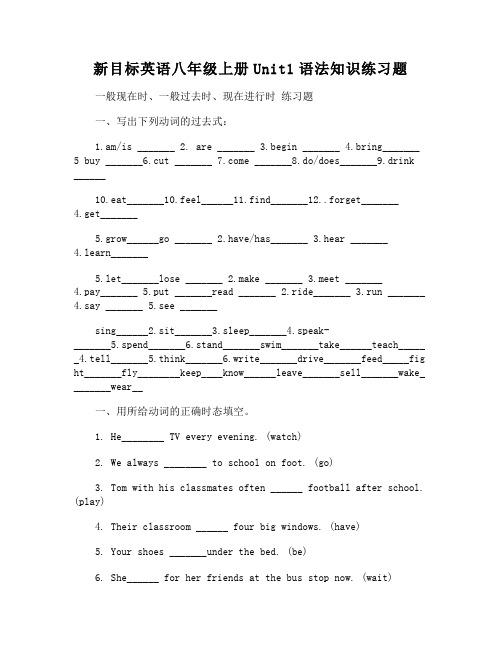
新目标英语八年级上册Unit1语法知识练习题一般现在时、一般过去时、现在进行时练习题一、写出下列动词的过去式:1.am/is _______2. are _______3.begin _______4.bring_______ 5 buy _______6.cut _______ e _______8.do/does_______9.drink ______10.eat_______10.feel______11.find_______12..forget_______4.get_______5.grow______go _______ 2.have/has_______ 3.hear _______4.learn_______5.let_______lose _______ 2.make _______ 3.meet _______4.pay_______5.put _______read _______ 2.ride_______ 3.run _______ 4.say _______ 5.see _______sing______2.sit_______3.sleep_______4.speak-_______5.spend_______6.stand_______swim_______take______teach_____ _4.tell_______5.think_______6.write_______drive_______feed_____fig ht_______fly________keep____know______leave_______sell_______wake_ _______wear__一、用所给动词的正确时态填空。
1. He________ TV every evening. (watch)2. We always ________ to school on foot. (go)3. Tom with his classmates often ______ football after school. (play)4. Their classroom ______ four big windows. (have)5. Your shoes _______under the bed. (be)6. She______ for her friends at the bus stop now. (wait)7. Sorry, I_______ no enough money with me now. (have)8. The days _______ longer and longer now. (get)9. _____ here and ______ by me. (come, stand)10. Look, the bus _______. (come)11. His uncle usually _________ to work by bus. (go)12. Sorry, I’m busy. I ______to a friend (write)13. There_____no hospitals here ten years ago. (be)14. It _____ very hard. We’d better stay at home. (rain)15. I always ______ up at six in the morning, but I _____up a little later yesterday. (get )16. She ______swim very well when she was five years old. (can)17. They ________ in Beijing in 1960. (be)18. He always _______ to work by bike when he was in Shanghai. (go)19. They never________in the room. (smoke)20. I______ to school yesterday because I ____ill. (not go, be)21. John ________ like his father. (look)22. Be quiet. The baby ______.(sleep)23. Some young people _______in the lake. (swim)24. We saw an __________ movie and we were __________ about it. (exciting)二、按要求变换句型。
人教版新目标八年级英语上册第一单元语法情态动词的用法及练习
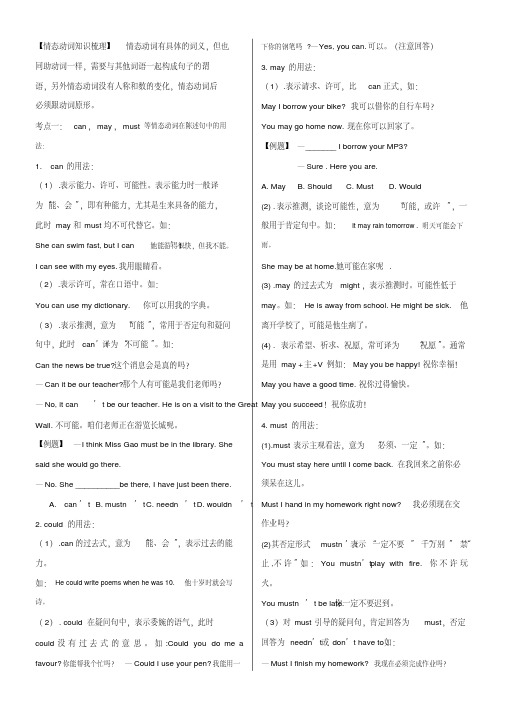
【情态动词知识梳理】情态动词有具体的词义,但也同助动词一样,需要与其他词语一起构成句子的谓语,另外情态动词没有人称和数的变化,情态动词后必须跟动词原形。
考点一:can,may,must等情态动词在陈述句中的用法:1.can的用法:(1).表示能力、许可、可能性。
表示能力时一般译为“能、会”,即有种能力,尤其是生来具备的能力,此时may和must均不可代替它。
如:She can swim fast, but I can’t .她能游得很快,但我不能。
I can see with my eyes.我用眼睛看。
(2).表示许可,常在口语中。
如:You can use my dictionary. 你可以用我的字典。
(3).表示推测,意为“可能”,常用于否定句和疑问句中,此时can’t译为“不可能”。
如:Can the news be true?这个消息会是真的吗?—Can it be our teacher?那个人有可能是我们老师吗?—No, it can’t be our teacher. He is on a visit to the Great Wall.不可能。
咱们老师正在游览长城呢。
【例题】—I think Miss Gao must be in the library. Shesaid she would go there.—No. She __________be there, I have just been there.A.can’tB. mustn’tC. needn’tD. wouldn’t2. could的用法:(1).can的过去式,意为“能、会”,表示过去的能力。
如:He could write poems when he was 10. 他十岁时就会写诗。
(2). could在疑问句中,表示委婉的语气,此时could没有过去式的意思。
如:Could you do me a favour?你能帮我个忙吗?—Could I use your pen?我能用一下你的钢笔吗?—Yes, you can.可以。
新目标八年级上册英语UNIT3词汇语法讲解与练习

词汇点睛一.基础词汇,写出下列单词。
1较好的(地)2辛勤的3哪一个4有才能的5关心6清楚地7爱交际的8大声地9安静地10极好的二.重点词汇讲解1. better是good/well的比较级,意为“更好的”“较好地”.2.loudly 意为“大声地”是由形容词loud转变的副词用来修饰动词。
和它相同的副词还有quietly ,clearly ,truly 等。
3 .win 意为“获胜,赢”动词,其后接比赛和活动类,但是不能接人.例如,My brother often wins the ping pong games.其过去式为won 名词为winner “获胜者”.4.which“哪一个”特殊疑问词通常对于名词的定语提问5 both “两者都” 位于句中be,情态动词,助动词之后,实意动词之前。
例如,They are both teachers.他们两个都是老师。
We can both ride a bike.我们俩个都会骑车。
My parents both like noodles.我父母都喜欢面条。
Both…and 意为“…和…都” “不仅…而且…”例如Both he and I like watching TV.他和我都喜欢看电视。
6 .as…as意为“和….一样”中接形容词,副词原形。
not so(as)…as“和…不一样”.例如I am as tall as my friend.我和我朋友一样高。
句型透视一、必背句1.Tom比Sam更聪明吗? 不,Sam比Tom更聪明。
Is Tom Sam? No, he . Sam isthan Tom.2.Tara和Tina学习一样努力。
Tara works hard Tim.3.你的父亲和母亲谁更受欢迎?Who is , your father or your mother?二.例句解析1. Both Sam and Tom can play the drums , but Sam plays them better than Tom. Sam 和Tom 都会打鼓但是Sam比Tom 打得更好。
新目标八年级英语上册复习(分语法 单元讲解 习题操练)
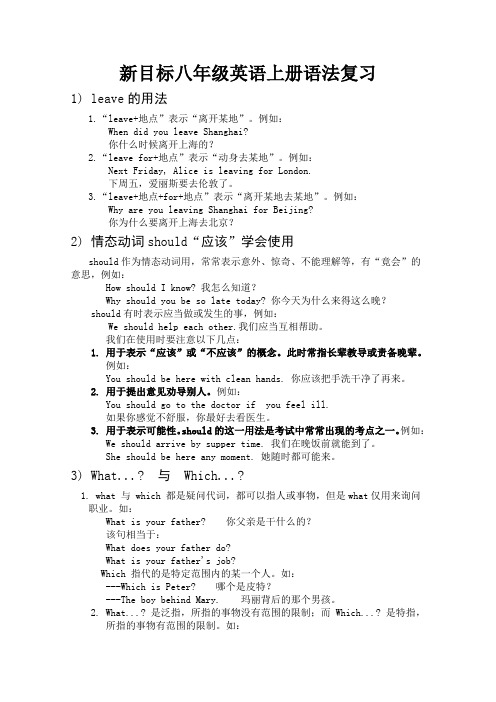
新目标八年级英语上册语法复习1) leave的用法1.“leave+地点”表示“离开某地”。
例如:When did you leave Shanghai?你什么时候离开上海的?2.“leave for+地点”表示“动身去某地”。
例如:Next Friday, Alice is leaving for London.下周五,爱丽斯要去伦敦了。
3.“leave+地点+for+地点”表示“离开某地去某地”。
例如:Why are you leaving Shanghai for Beijing?你为什么要离开上海去北京?2) 情态动词should“应该”学会使用should作为情态动词用,常常表示意外、惊奇、不能理解等,有“竟会”的意思,例如:How should I know? 我怎么知道?Why should you be so late today? 你今天为什么来得这么晚?should有时表示应当做或发生的事,例如:We should help each other.我们应当互相帮助。
我们在使用时要注意以下几点:1.用于表示“应该”或“不应该”的概念。
此时常指长辈教导或责备晚辈。
例如:You should be here with clean hands. 你应该把手洗干净了再来。
2. 用于提出意见劝导别人。
例如:You should go to the doctor if you feel ill.如果你感觉不舒服,你最好去看医生。
3. 用于表示可能性。
should的这一用法是考试中常常出现的考点之一。
例如:We should arrive by supper time. 我们在晚饭前就能到了。
She should be here any moment. 她随时都可能来。
3) What...? 与 Which...?1. what 与 which 都是疑问代词,都可以指人或事物,但是what仅用来询问职业。
新目标八年级上册英语语法知识点精讲+练习

新目标八年级上册英语语法知识点精讲+练习(一)一般将来时一般将来时表示将来某个时间要发生的动作或者存在的状态。
通常与表示将来的时间状语连用,如tomorrow, the day after tomorrow, next year, next month, next week, in 100 years等。
be going to do (动词原形)结构:表示打算、准备做的事情或者肯定要发生的事情。
如:It is going to rain.will do 结构表示将来的用法:1. 表示预见Do you think it will rain?You will feel better after a good rest.2. 表示意图I will borrow a book from our school library tomorrow.What will she do tomorrow?基本构成如下:一般疑问句构成:(1)will+主语+do…? Will Sarah come to visit me next Sunday?(2)there be 结构的一般疑问句:Will there + be …?Will there be fewer trees? Yes, there will. / No, there won’t 否定句构成:will + not (won’t)+doSarah won’t come to visit me next Sunday.特殊疑问句构成:特殊疑问词+will+主语+…?What will Sarah do next Sunday?★★练一练★★根据例句,用will改写下列各句例:I don’t feel well today. (be better tomorrow)I’ll be better tomorrow.1. Gina has six classes today. (have a lot of homeworktonight)_____________________________2. I’m tired now. (sleep later)_____________________________3. My parents need a new car. (buy one soon)_____________________________4. We can’t leave right now. (leave a little later)_____________________________5. The weather is awful today. (be better tomorrow)_____________________________答案:1. She’ll have a lot of homework tonight.2. I’ll sleep later.3. They’ll buy one soon.4. We’ll leave a little later.5. Maybe it’ll be better tomorrow.(二)should的用法:should用来提出建议和忠告,后边加动词原形,否定句直接在should后边加not.例如:I think you should eat less junk food.我认为你应该少吃垃圾食品。
- 1、下载文档前请自行甄别文档内容的完整性,平台不提供额外的编辑、内容补充、找答案等附加服务。
- 2、"仅部分预览"的文档,不可在线预览部分如存在完整性等问题,可反馈申请退款(可完整预览的文档不适用该条件!)。
- 3、如文档侵犯您的权益,请联系客服反馈,我们会尽快为您处理(人工客服工作时间:9:00-18:30)。
新目标八年级上册英语语法知识点精讲+练习(一)一般将来时一般将来时表示将来某个时间要发生的动作或者存在的状态。
通常与表示将来的时间状语连用,如tomorrow, theday after tomorrow, next year, nextmonth,nextweek, in100years等。
be going to do(动词原形)结构:表示打算、准备做的事情或者肯定要发生的事情。
如:It isgoing to rain.will do结构表示将来的用法:1. 表示预见Do youthinkitwill rain?You will feel better after a good rest.2.表示意图I will borrow a book fromour schoollibrary tomorrow.What will she dotomorrow?基本构成如下:一般疑问句构成:(1)will+主语+do…?Will Sarah cometo visit me next Sunday?(2)there be结构的一般疑问句:Willthere+ be …?Willtherebe fewertrees? Yes, there will./ No, there won’t否定句构成:will + not(won’t)+doSarah won’t come to visitme next Sunday.特殊疑问句构成:特殊疑问词+will+主语+…?What willSarah do nextSunday?★★练一练★★根据例句,用will改写下列各句例:I don’t feel well today.(be better tomorrow)I’ll be better tomorrow.1.Gina hassix classes today. (have a lot ofhomework tonight)_____________________________2.I’m tired now. (sleeplater)_____________________________3. My parentsneed anew car.(buyonesoon)_____________________________4.We can’tleave right now. (leave a little later)_____________________________5. The weather is awful today.(be better tomorrow)_____________________________答案:1.She’ll havealot of homeworktonight.2. I’ll sleep later.3. They’ll buyone soon.4.We’ll leave a little later.5.Maybeit’llbe better tomorrow.(二)should的用法:should用来提出建议和忠告,后边加动词原形,否定句直接在should后边加not.例如:I think youshould eatlessjunk food.我认为你应该少吃垃圾食品。
She drives alot andsheseldom walks. SoI think she should walk alot.她经常开车,很少走路。
所以我认为她应该多走路。
Students shouldn’t spend too much timeplayingcomputer games.学生们不应当花太多的时间玩计算机游戏。
学习向别人提建议的几种句式:(1)I think youshould…(2)Well, youcould…(3)Maybe you should…(4)Why don’t you…?(5)What aboutdoingsth.?(6)You’dbetter do sth.★★练一练★★用should或shouldn’t填空1.I can’t sleep thenightbefore exams.You______ take awarmshower before you go to bed.2.Good friends ______ argueeachother.3.Thereis little milkin the glass. We_______ buysome.4.They didn’tinviteyou? Maybe you ______ be friendlier.5. I am a little bitoverweight.SoIthink I _______do exercises every day.答案:1. should 2. shouldn’t3. shouldﻩ4. shouldﻩ5. should(三)过去进行时过去进行时表示过去某一点时间正在进行的动作或者过去某一段时间内一直进行的动作。
1. 构成was /were +doing,例如:Iwas watching TVat 9 o’clock lastnight.at9 o’clock last night是时间点They were playing football all afternoon.all afternoon是时间段2.过去进行时的标志词at8o’clocklastnight,this time yesterday等。
例如:I was having lunchathomethis timeyesterday.昨天的这个时候我正在吃午饭。
Atthattime she waswriting a book.那阵子她在写一本书。
(表示她在那段时间里一直在做那件事情。
)★★练一练★★用括号中所给动词的适当形式填空。
1. This time yesterday I __________(read)books.2. At 9 o’clock lastSunday they ____________(have)a party.3.WhenI_____(come)into theclassroom, she________ ______(read)a storybook.4. She_____ ______(play)computer gameswhile hermother ____ ______(cook)yesterdayafternoon.5.I ___________(have)a shower when you _______(call)me yesterday.2. were havingﻩ3.came; wasreading答案:1. was readingﻩﻩ4.was playing;was cookingﻩ5. was having; called(四)间接引语形成步骤:(1)不要逗号,冒号,引号(2)要考虑到人称的变化(人称的变化与汉语是一致的)(3)要考虑时态的变化(4)要考虑时间状语、地点状语和语示代词的变化。
1.2.用括号中所给动词的适当形式填空。
1. She saidI_____(be)hard-working.2. Peter told mehe_____(be)bored yesterday.3. Shesaid she _____(go)swimming last Sunday.4.Bobbysaid he_____(may)call me later.5. Antoniotold me he_____(read)a bookthen.2. was ﻩ3. wentﻩﻩ4. might5. was reading答案:1. wasﻩﻩ请转述他人说的话:1. I go to the beach every Saturday. (Tom)2. Ican speak threelanguages. (Lucy)3.I will call you tomorrow. (Mike)4. I’m having a surprise party for Lana.(she)(五)if引导的条件状语从句结构:if+一般现在时,主语+将来时含义:如果……,将要……例如:If youask him, he will helpyou.如果你请求他,他会帮助你。
If need be, we’ll work all night.如果需要,我们就干个通宵。
★★练一练★★根据中文提示,完成句子。
1.如果你参加聚会,你将会过得很开心。
If you ________theparty,you __________.2. 如果明天下雨,我们将不去野餐。
If it __________tomorrow, we ___________.3. 如果你经常听英文歌,你将会喜欢英语的。
Ifyou often________, you _________________.答案:1. If yougo to the party, youwill have a good time2. If itrains tomorrow,we won’t go tothe picnic3.If you often listento English songs, you’lllike English实战操练一.选择填空。
( )1.Beijing won thechances _________the 2008Olympics.A.to host B. hostﻩﻩﻩC.hostingﻩﻩD. hosted()2. TigerWoods can makebillions ______dollars a year.A.forﻩB. withﻩﻩC. ofﻩ D. on( )3.-Youlooked sobeautiful at the party.-_______.A. No,I don’tthink soB. OfcourseC. Thank you very muchD. No,I’m notbeautiful()4.Thetext isveryeasy for you.Thereare______ newwordsin it.A.a few B. alittleﻩﻩC. fewﻩD.little()5.In the bookshop, a readerasked the shopkeeper ________“WhoMoved Mycheese”was a ninteresting book.A. that ﻩB.what C. howﻩ D. if()6. -In our English study reading is more interesting than speaking, I think.-Idon’tagree. Speaking is _______ reading.A. as important asﻩB. so important asC. the moreimportant D. the most important()7. If he ________harder,he’ll catch up with us.A. workﻩﻩB.worksﻩC.worked ﻩD.willwork()8.The manager ________thatthebusinesswouldbe worseafterthe stock(股票)went down.A. talked B.told ﻩC.saidD. spoke( )9. We should keep_________ inthe reading-room.A. quietﻩB. quietlyﻩﻩC. quiteﻩD.quickly()10. -Ithink everything goes on well.-_______.A. So IdoﻩB.IdosoﻩﻩC. Sodo I ﻩD.Sois I()11.If you wantto watchTV, you mayturn _______.A.down B. it onﻩC.on it ﻩD.it off()12. I’m sorry Ihaven’t got any money. I’ve________myhandbagat home.A.missedﻩﻩB.leftﻩﻩC.putﻩﻩD.forgotten()13.Heis listening to the music_______ sheis washing clothes.A. afterﻩﻩB. beforeﻩC.thatﻩﻩD.while()14.It takes ________time togo toBeijing by planethan by train.A. moreﻩﻩB.fewerﻩC.longerﻩD. less( )15. -Excuseme. Have you got an eraser?-Sorry,Ihaven’t. Why _______youask Mary?Perhaps she’s gotone.A. doﻩﻩB. don’tﻩC.didﻩﻩD.didn’t把下面五个句子放在文章中的恰当位置,使文章完整。
